Leveraging AI for decision-making is another nifty AI use case that can help you improve operational efficiency across levels - provided you know how to apply it and which business areas are most suitable for it.
In this guide, I’ll share the tested and tried tips, tricks, and best practices for efficiently using AI for decision-making, helping you unlock your business’s full potential.
As a bonus, I’ll recommend some of the best AI tools that can enhance your decision-making process, giving you a great starting point for your AI journey.
Let’s go!
TL;DR
- AI improves decision-making speed and accuracy by analyzing large data sets quickly, minimizing manual tasks, and enhancing real-time adaptability.
- AI can also recognize trends and patterns, enabling you to create data-driven strategies for product development, pricing, and market expansion.
- You can also use AI to accurately predicts demand, optimize stock levels, and mitigate supply chain disruptions.
- It can be leveraged for personalization, such as delivering targeted recommendations, customized promotions, and dynamic content to improve customer engagement and loyalty.
- Popular AI Tools include Team-GPT, Insight7, Athenic AI, InstantPersonas, and Quantive, which assist with tasks like data analysis, customer persona development, and strategic planning.
How Is AI Used To Improve Decision-Making?
Did you know that over 40% of CEOs use AI to inform their decision-making process?
However, if you’re still having doubts about how an algorithm could help you, a human, make optimal decisions, here’s a quick breakdown of how it works.
It all starts with AI’s key trait—its ability to analyze large sets of unstandardized data in seconds, identify patterns, extract insights, and make data-driven predictions.
What’s more, AI is much more precise than humans when analyzing data and is not prone to emotional and other biases, reducing the chance of error and ensuring consistent data accuracy and quality.
As a result, stakeholders are provided with deep, actionable insights and accurate, reliable, real-time information, enabling them to make informed decisions, ultimately leading to better business outcomes.
This makes AI a godsend in many business areas, especially those requiring careful analysis of vast amounts of data, such as risk management, financial services, sales and demand forecasting, and more.
The best way to understand how AI can enhance decision-making is through a practical example.
Take a rapidly growing retail business that, due to its size, faces several challenges, such as efficiently handling inventory management, smoothly expanding to new markets, and providing good customer experiences at scale.
Implementing AI can help tackle all these challenges, enabling the business to:
- Optimize its inventory, as the AI will analyze historical and real-time data and predict trends and demand.
- Manage its supply chain more efficiently, thanks to AI providing reliable data on potential disruptions and bottlenecks.
- Get a deep insight into market conditions, customer demand, and competitors’ strategies, allowing it to set competitive prices and design optimized sales and marketing strategies.

What Are The Benefits Of Using AI To Enhance Decision-Making?
When considering using AI to improve your decision-making, you should first understand what you can expect from implementing AI.
So, let’s look at some of the key benefits of using AI for decision-making.
1. Improved efficiency
If there’s one thing you can expect from implementing AI in your decision-making processes, it’s a significant efficiency boost.
AI can analyze large amounts of data in seconds, helping businesses make decisions in real-time.
This speed is precious in fast-paced industries like e-commerce, where rapid adjustments in pricing, inventory, or marketing strategies can drive better results.
But that’s not all. AI can also automate repetitive decision-making tasks, such as customer service queries, invoice processing, and basic data analysis, making these routine operations more efficient.
As a result, your team will have more time to focus on strategic work, i.e., decision-making, leveraging the data and insights AI provided.
2. Better accuracy
Being able to make decisions faster would do you little good if those decisions were based on incorrect insights or biases.
Fortunately, AI can process vast datasets with 99% accuracy, improving the quality of insights you get and allowing you to make better-informed decisions.
This is especially useful when it comes to areas that depend on several highly complex factors, such as supply chain management, where you have to take into account:
- Logistics.
- Inventory.
- Sales.
- Potential disruptions.
AI can easily integrate and analyze data from these multiple sources, providing comprehensive insights that make it easier to make decisions.
Moreover, when analyzing large amounts of data, AI minimizes the chance of error and removes bias.
Namely, humans can easily get lost in mountains of data they need to process or make unobjective decisions based on personal preferences and prejudice.
AI removes all this from the formula, improving the overall reliability of the output you get.
This accuracy is critical in fields like finance, healthcare, etc., where even small mistakes can have enormous consequences.
3. Increased agility and adaptability
When you consistently receive accurate, real-time insights into relevant information such as market trends, demand, etc., you’ll be able to adjust to any potential disruption before anyone else.
And that’s exactly what AI allows businesses to do—respond quickly to market changes by continuously monitoring relevant data and adjusting recommendations, helping executives make optimal decisions that set them up for success.
This agility is especially valuable in dynamic industries where consumer behavior, regulations, or competitors’ actions may shift rapidly.
4. More informed strategic planning
AI identifies patterns and trends that human analysis might miss, helping you make informed decisions in areas that require careful strategic planning, such as market expansion, product development, and competitive positioning.
Namely, AI can analyze all kinds of relevant data, including market conditions, competitors’ strategies, customer reviews, and more.
As a result, you’ll be able to create data-driven strategies, including:
- Marketing and sales approaches tailored to customers’ needs, pain points, and expectations.
- Setting realistic prices.
- Product development, ensuring that its features and capabilities are going to resonate with your customers
5. Lets you make decisions proactively
Making decisions in real-time is challenging enough, but it gets even worse when you need to make them proactively.
For instance, stocking your e-commerce inventory months ahead can quickly become a nightmare if you don't know what factors to consider when making the decision.
AI can help by using predictive analytics to forecast future trends based on historical data, allowing you to make accurate decisions in advance.
This way, you’ll be able to adjust your inventory levels and stock products that will be in high demand, as shown in the example above.
Moreover, AI supports scenario planning by analyzing the potential outcomes of various choices, helping leaders evaluate the best options based on predicted consequences.
This capability is especially useful in fields like product launches or investments that can have many possible outcomes depending on specific factors.
Pro tip: You can use the Fork Chat feature in Team-GPT to test various scenarios without losing or messing up the original chat.
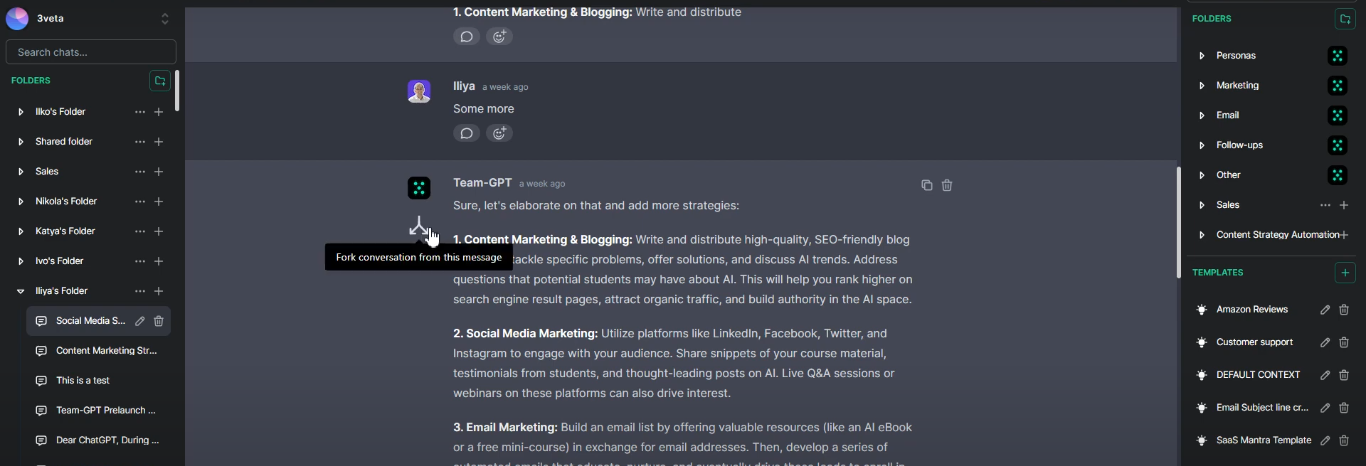
This way, you and your team can explore various potential outcomes simultaneously, gaining a 360-degree view of the entire situation and all possible scenarios.
Top 7 Use Cases Of AI-Powered Decision-Making
Although you can apply AI in decision-making in many different areas, some are especially suitable for it, including the following:
1. Providing personalized customer experiences
AI can help sales and marketing stakeholders deliver highly personalized experiences for every customer on scale.
Instead of manually processing data such as web search history, purchase behavior, and relevant preferences—which takes time and opens the door to many potential errors and oversights—you can leave it to AI.
AI models will gather and analyze relevant customer data and deliver:
- Personalized product recommendations, ensuring that each customer is presented with the set of products that’s most likely to spark their interest.
- Dynamic content personalization, including on-site elements like banners, promotions, offers, etc.
- Customized discounts and promotions tailored to each customer’s sensitivity to price changes, purchase history, and engagement with promotional content.

Benefits of this use case include more conversions, increased customer loyalty, higher retention rates, and optimized marketing spend.
Moreover, these insights can be used for higher-level decision-making, such as developing products or expanding to new markets.
2. Risk assessment and management
Using AI for risk management can improve the efficiency of your risk mitigation systems by up to 40%, a figure well worth considering.
AI models can continuously monitor vital business processes, ranging from financial transactions to online orders, and detect anomalies indicating potential criminal activity.
Additionally, AI can be trained to score risk based on predefined factors you input, allowing you to assess risk levels from a customer, supplier, partner, or any other third party.
As a result, risk and compliance teams can focus on what really matters, like screening and checking only the relevant risks identified by AI instead of dispersing their attention over vast amounts of data.
This also enables you to provide smoother customer experiences, as the entire onboarding and risk screening process will be automated, making it much faster and less intrusive, especially for financial institutions.
3. Inventory optimization
Managing inventory is far from easy, as any small mistake or miscalculation can increase storage costs, lead to over- and understocking, and result in many missed opportunities due to product availability.
AI models can predict demand based on sales trends, seasonality, and external factors like weather conditions or the economic situation, helping retail and similar businesses make optimal decisions regarding their inventory.
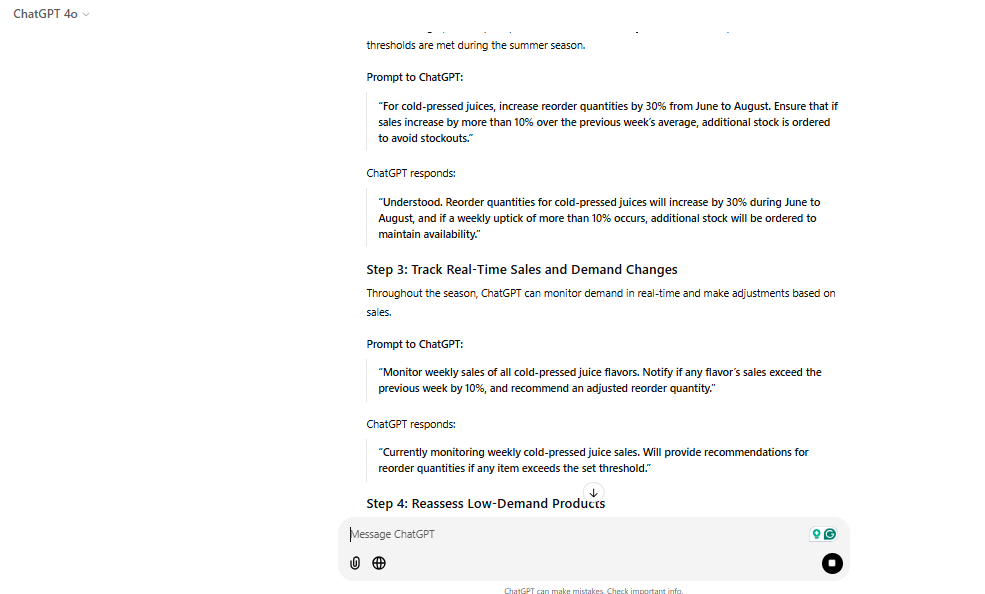
As a result, these businesses will be more agile and capable of meeting their customers’ needs even in the toughest market conditions.
4. Talent management and recruitment
AI can also be hugely helpful to HR.
If you’ve ever been involved in the hiring process, you know what a pain it can be, both for the employer and the candidates.
Assessing each candidate fairly and giving everyone an equal chance during the hiring process is no easy task.
AI can help with that by screening resumes, assessing candidate qualifications, and predicting potential performance based on past hiring data and job requirements. This can save you tons of time and ensure that no quality candidate falls through the cracks.
This way, the chances of finding candidates who are the best fit for both the role and your company culture significantly improve, leading to a 30% increase in efficiency and a 50% reduction in cost-per-hire in some cases.
5. Dynamic pricing
Being able to quickly adjust your prices to current market conditions, supply chain disruptions, increases or decreases in demand, etc., is often the difference between staying competitive and going under in the fast-paced digital landscape.
AI can help you adjust pricing in real-time, leveraging data such as demand, competitor prices, customer behavior, and other external factors.
This allows decision-makers to easily set competitive prices for their products and ensure an optimal profit margin—a goal that would be tough to achieve without careful data analysis.
6. Ad optimization
If you’re a sales or marketing professional, you’re probably already well aware of the many benefits and potential use cases of AI in your sector.
Optimizing decision-making is yet another possible application in this industry, as it can analyze customer data to determine which ads to show to which audiences.
AI models predict everything from the most effective messaging and timing to the best channel to reach each customer segment.
The results?
Increased ROI, better engagement, and a reported 35% increase in conversion rates in some instances.
7. Document analysis
Did you know that AI can also help you analyze any type of documentation?
Instead of reading through text-heavy files such as contracts, legal documentation, etc., you can save time and reduce the chance of error by letting AI do it for you.
For instance, you can feed any document into an AI platform like Team-GPT and prompt it to summarize it, extract vital insights, identify critical points, recognize sentiment, or flag potential risks.
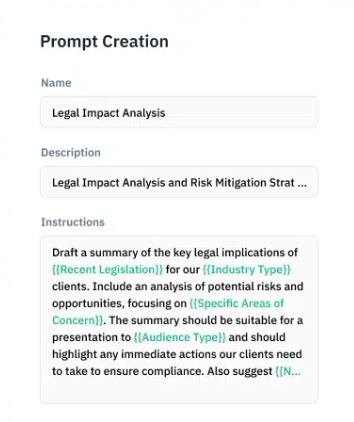
This way, you can get all the information you need for any document or similar content in seconds instead of hours and leverage it to make optimal decisions.
Examples of Companies Using AI For Decision-Making
Today, about half of all businesses report adopting AI in at least one area, often including decision-making.
Here are a few examples of successful companies that leverage AI to enhance decision-making in different business operations.
1. Financial House
Financial House is a global financial services provider that guarantees smooth, quick, and safe transactions to its clients.

However, the digital era introduced a number of new risks, making ensuring safety in financial services challenging.
This is why Financial House adopted an AI-driven risk management solution that enables it to streamline the entire compliance process, continuously monitor for risks, and be notified in real time when a threat occurs.
As a result, the company experienced a significant operational efficiency boost, improved employee and customer experiences, and safety across levels.
2. Amazon
Amazon is known for its wide use of AI to optimize a number of business processes.
For instance, it uses AI to analyze images and videos to improve product listings and recommendations, instead of relying on manual effort, which would take more time and wouldn’t be as accurate.
It also leverages AI to increase supply chain efficiency by forecasting demand, optimizing inventory levels, and improving routing orders.
3. Meta
Meta is another company that uses AI to deliver optimal, highly personalized customer experiences.
If you’ve been wondering how your feed is so tailored to your interests and preferences, it’s AI you can thank.

AI-driven algorithms recommend stories, accounts to follow, and reels to watch based on a number of relevant factors, such as:
- Previous interaction with content (watches, likes, shares).
- Demographics.
- Location, etc.
Best AI Tools To Improve Decision-Making
And now, I’ll quickly break down some of the best tools you can rely on to help you harness AI for decision-making.
1. Team-GPT

First up is Team-GPT - the platform I regularly use alongside my team and thousands of satisfied business users from various industries.
Team-GPT is a model-agnostic AI platform that lets your team work together on AI chats, using them for everything from ideation and content creation & editing to analyzing data, extracting vital insights, and more.
What sets Team-GPT apart from other AI-driven tools is the following:
- You can easily switch between AI models within one chat, enabling you to use the model best suited for your current needs every time.
- Everyone on your team can work in the chat, giving prompts, leaving comments, reactions, etc.

- Chat Forking allows you to test various scenarios to get a complete view of a problem, enabling you to make informed decisions every time.
- Prompt library with customizable pre-made prompts for common use cases that help you save time (you can also create and save custom prompts tailored to your organization).
- Flexible AI toolkit that can be fully customized to fit your organization’s needs and objectives.
- Build expert personas for certain areas and use them to get expert advice, suggestions, and insights into a topic.
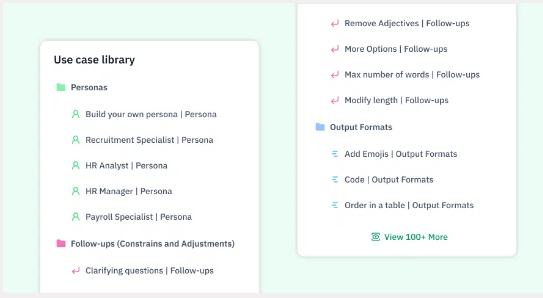
- Options to save and organize chats in folders and subfolders for easier navigation.
As such, Team-GPT is best suited for teams of all sizes looking to adopt AI smoothly and make the most of its unbridled potential.
2. Insight7
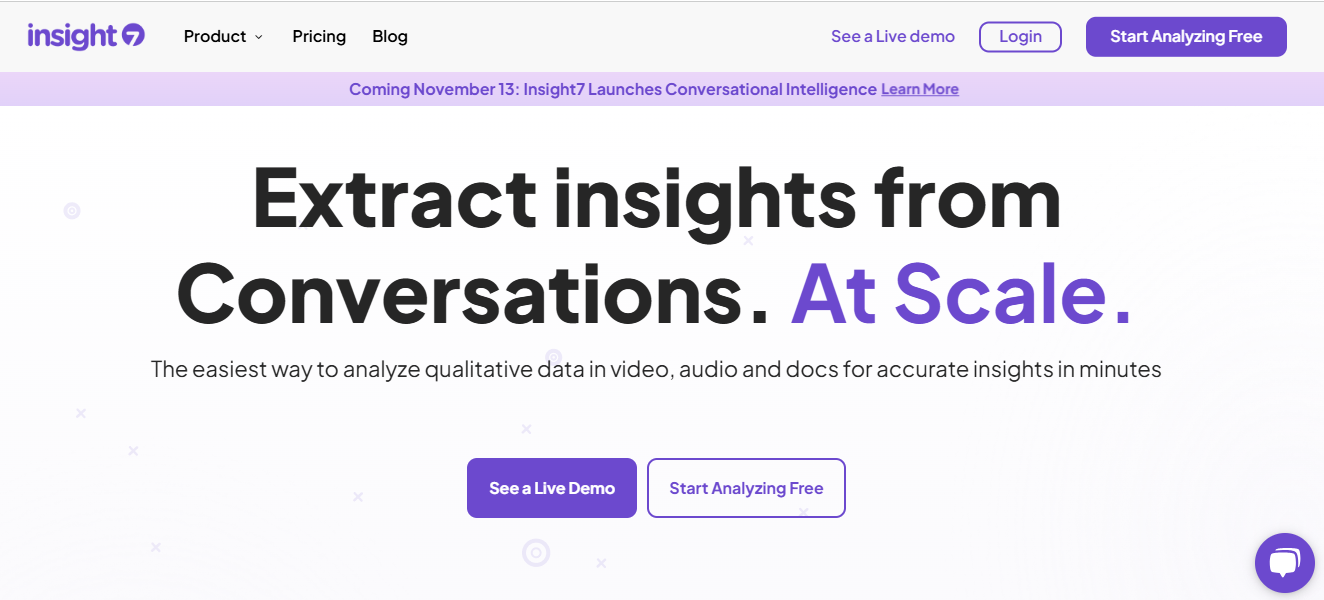
Insight7 is a nifty tool for HR, sales, and marketing people who need to quickly extract insights and key points from conversations.
Insight7 leverages AI to analyze documents, audio, and video files and can:
- Provide accurate transcriptions.
- Extract themes and actionable insights across multiple files in just one click.
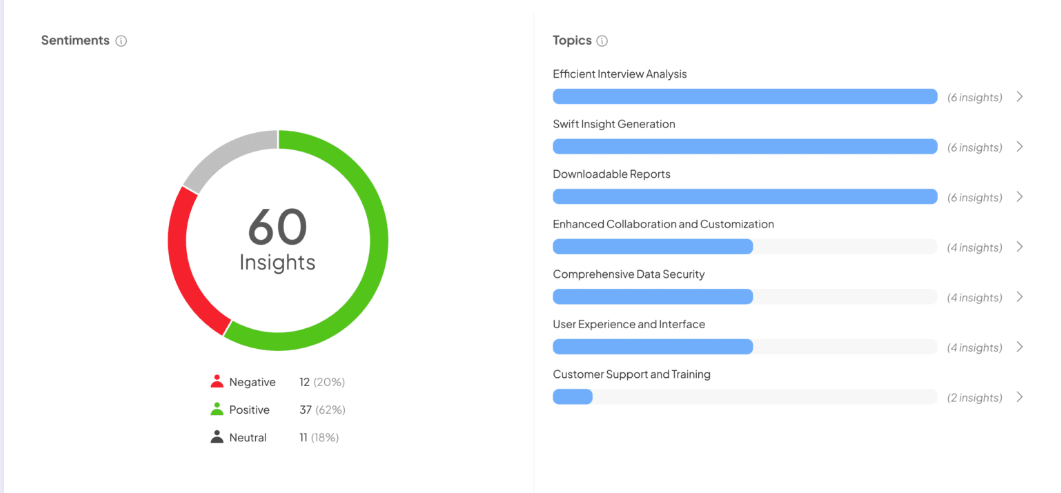
- Generate detailed reports and visual maps that help you track the entire conversation and easily pinpoint key questions, pain points, churn risks, behavior insights, and more.
3. InstantPersonas
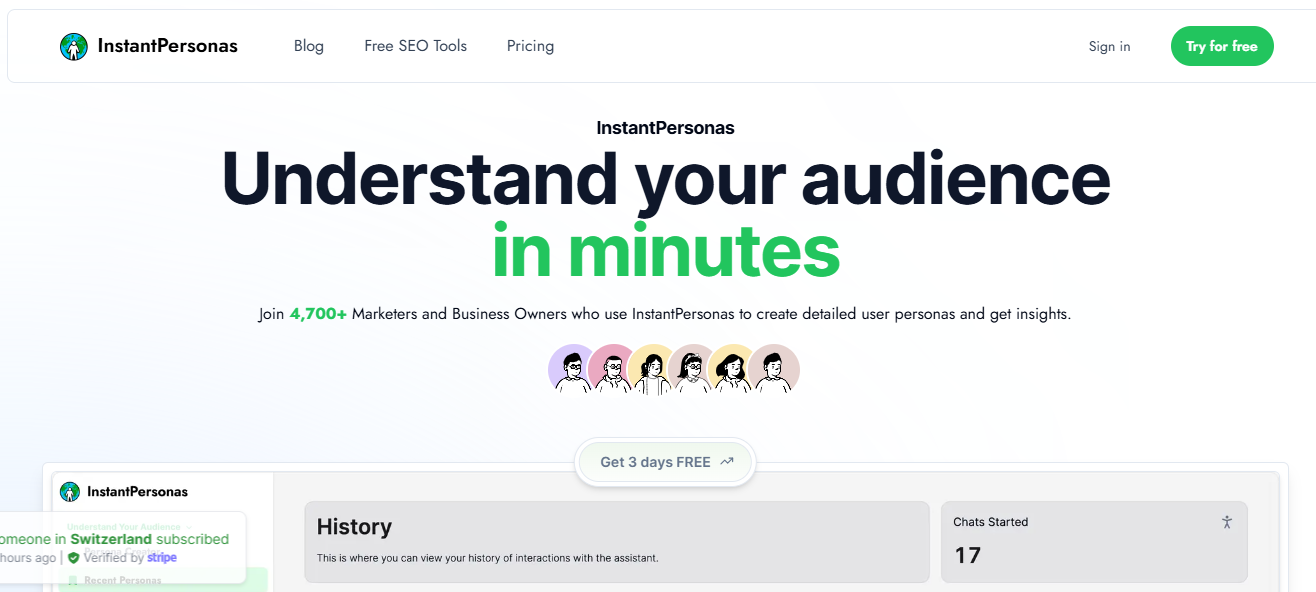
InstantPersonas uses AI to help businesses handle a vital process - creating their Ideal Customer Persona.
Without a good understanding of who you’re selling to and their needs, expectations, and problems, you cannot expect to create efficient and targeted sales and marketing strategies.
InstantPersonas helps you take care of that by creating your ICP in seconds based only on the description of your product or services.
The platform also provides:
- A detailed description of your ICP, including the kind of content they consume, the channels they are most likely to use, social media platforms they’re most active on, etc.

- See how your website would perform with your ICP.
- Create SEO-optimized content tailored to your ICP.
4. Quantive

Quantive is a comprehensive strategy management platform that leverages AI to help you plan, execute, and adapt to market changes in real time.
As such, it can be useful to managers and other executives who want to improve their decision-making and strategic planning with AI.
Some of its key capabilities include:
- Pulling actionable insights from relevant internal and external documentation and data, helping you make data-driven decisions.
- AI-driven recommendations help you set realistic goals and define the best ways of achieving them.
- Executive dashboards enable you to monitor the progress, contributions, and tasks of the entire team and each individual team member, as well as the overall project advancement.

5. Athenic AI
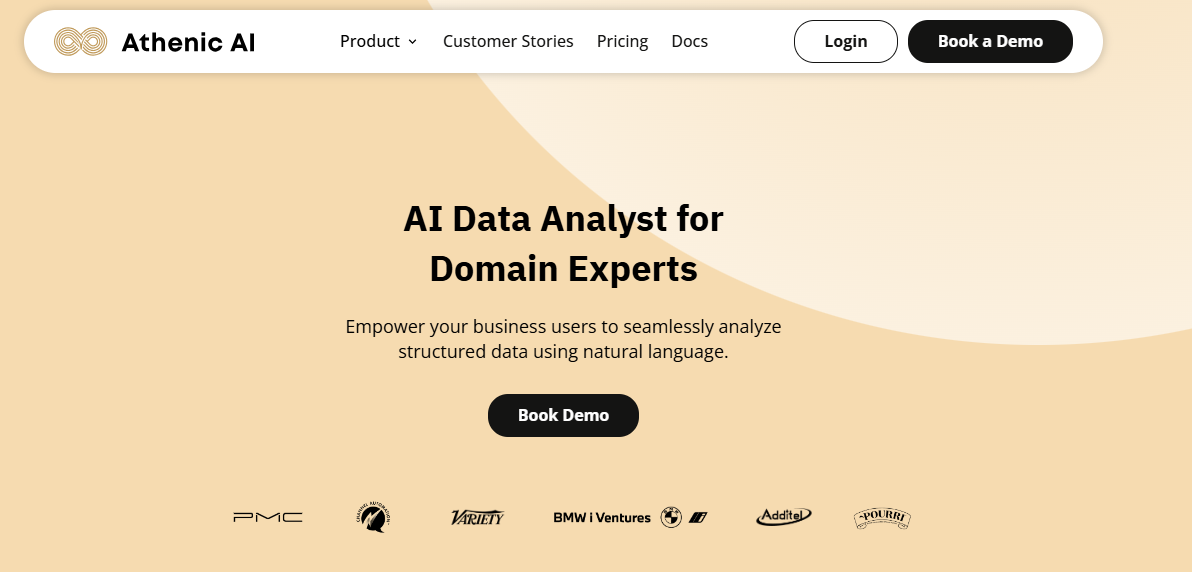
Athenic AI lets you make the most of unstructured data sets without being a data scientist.
All it takes is prompting the engine in natural language to analyze data in a certain way or pull specific insights, and it will deliver.
Its advantages include:
- High customization that lets you tailor its LLMs to your specific needs and data types.
- Generates charts and other visualizations in seconds based on natural language prompts.
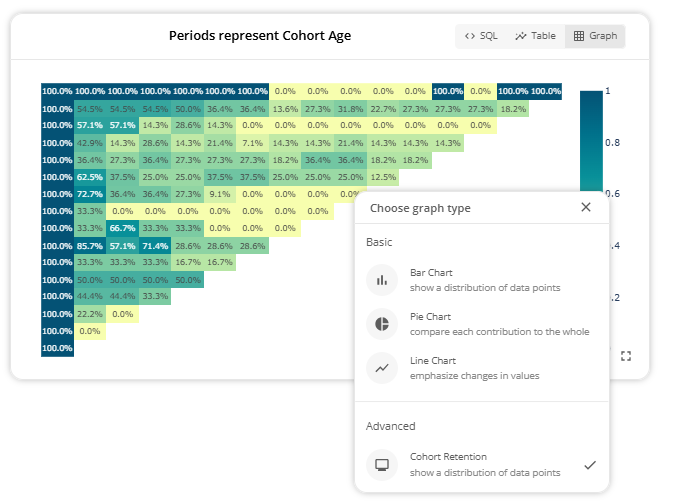
- Explainability, meaning that the platform will explain how it answered your questions and what led to the output you got.
Next Steps: Improve Your Decision-Making with Team-GPT
And now, all that’s left is to start implementing AI in your decision-making processes.
If you’re a team of 2 to 20,000 that needs to speed up AI adoption and ensure that every critical team member is onboard for optimal results, Team-GPT is the surest way to go.
Thanks to its versatility, you can use Team-GPT to optimize a number of business processes, ranging from decision-making in every area imaginable to creating content, analyzing data, improving sales and marketing strategies, and more.
Sounds too good to be true?
Book a demo today and see firsthand how Team-GPT can help you unlock your business’s full potential.

